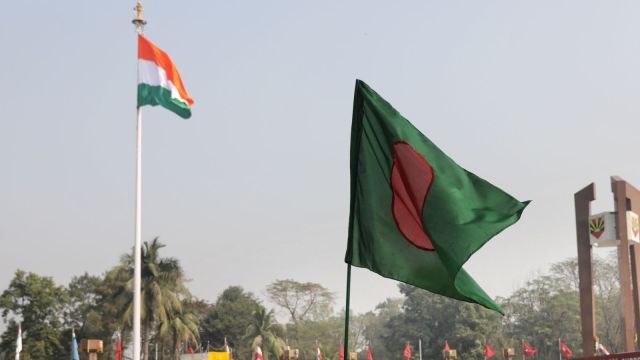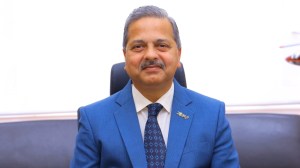Stay updated with the latest - Click here to follow us on Instagram
Bangladesh commission finds India’s ‘involvement in enforced disappearances’
Led by a retired Supreme Court judge, the five-member commission suggested there was a “persistent suggestion in law enforcement circles” that some Bangladeshi prisoners might still be held in Indian jails.
 The Bangladesh Sangbad Sangstha, citing the Commission of Inquiry on Enforced Disappearances, quoted the commission as saying, “The Indian involvement in Bangladesh's system of enforced disappearances is a matter of public record." (Express photo by Partha Paul)
The Bangladesh Sangbad Sangstha, citing the Commission of Inquiry on Enforced Disappearances, quoted the commission as saying, “The Indian involvement in Bangladesh's system of enforced disappearances is a matter of public record." (Express photo by Partha Paul)In another blow to the strained ties, an inquiry commission formed by Bangladesh’s interim government has alleged India’s involvement in cases of “enforced disappearances” during Sheikh Hasina’s tenure as the prime minister, according to state-run news agency BSS.
The Bangladesh Sangbad Sangstha, citing the Commission of Inquiry on Enforced Disappearances, quoted the commission as saying, “The Indian involvement in Bangladesh’s system of enforced disappearances is a matter of public record.”
Led by a retired Supreme Court judge, the five-member commission suggested there was a “persistent suggestion in law enforcement circles” that some Bangladeshi prisoners might still be held in Indian jails.
“We recommend the Ministries of Foreign and Home to extend their best efforts to identify any Bangladeshi citizens who may still remain incarcerated in India. It is beyond the jurisdiction of the commission to follow this trail outside Bangladesh,” the commission stated.
The inquiry said that it found the intelligence reports suggesting the exchange of captives between the two countries and the possible fate of the detainees.
The commission mentioned “two highly publicised cases” that provide insight on the operations of enforced disappearances. One case involved Shukhranjan Bali, who was abducted from the Bangladesh Supreme Court premises and later found in an Indian jail. The other case was that of Bangladesh Nationalist Party (BNP) leader Salahuddin Ahmed, whose experience exemplifies the Bangladesh-India rendition system.
In 2015, while hiding in a house in Dhaka’s Uttara area, Ahmed recounted being detained in a barren cell, with a hole in the ground serving as a toilet. He recalled receiving a blanket marked with the letters “TFI,” indicating it was from the “Task Force for Interrogation.”
The commission noted that during that time, the only operational TFI centre known was managed by the Rapid Action Battalion (RAB) Intelligence Wing. The commission later visited the location and confirmed that RAB still controls access to it, although the facility’s interior had been severely damaged.
Last week, the five-member commission submitted an interim report titled “Unfolding The Truth” to Chief Adviser Professor Muhammad Yunus. The report estimated that over 3,500 enforced disappearances had occurred. In addition to the chairman, the commission includes Justice Farid Ahmed Shibli, rights activist Nur Khan, BRAC University teacher Nabila Idris, and activist Sajjad Hossain.
The commission also mentioned the involvement of deposed prime minister Sheikh Hasina’s now-absconding defense adviser, retired major general Tarique Ahmed Siddique, along with a sacked major general, two senior police officers, and several other officials in the enforced disappearances. The commission revealed that the elite RAB, which includes personnel from the army, navy, air force, and police, had collaborated to abduct, torture, and detain victims.
The commission has proposed the abolition of RAB and suggested amending or scrapping the Anti-Terrorism Act, 2009. Commission member Sajjad Hossain stated that 1,676 complaints of enforced disappearances had been recorded, with 758 cases examined so far. Of these, 27% of victims never returned, and those who did were often falsely recorded as arrested. Additionally, the commission identified eight secret detention centres in Dhaka and its outskirts.
The commission plans to deliver another interim report in March and anticipates that it will take at least another year to complete its review of all allegations.
(With inputs from PTI)






- 01
- 02
- 03
- 04
- 05

























